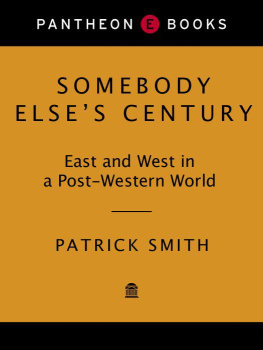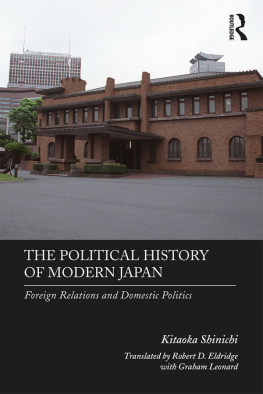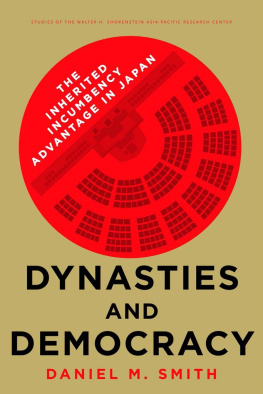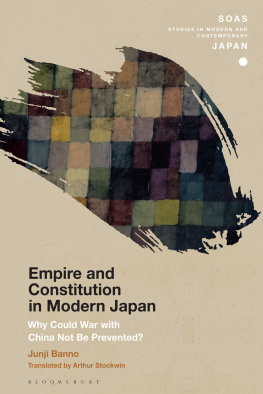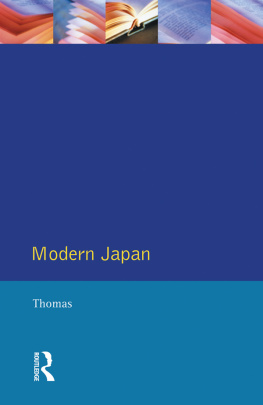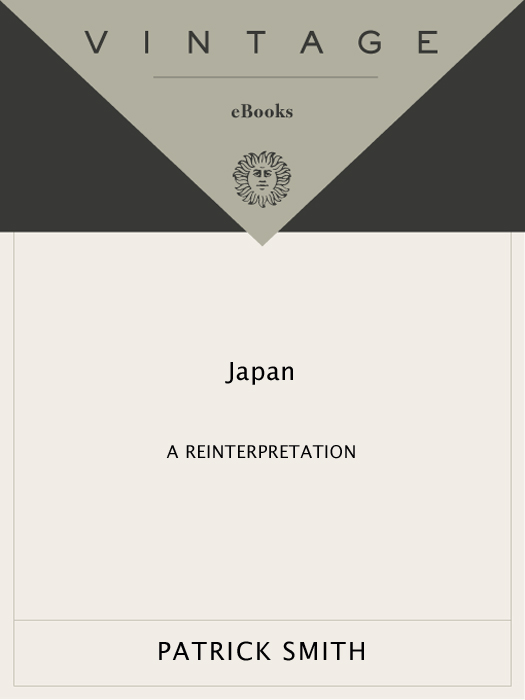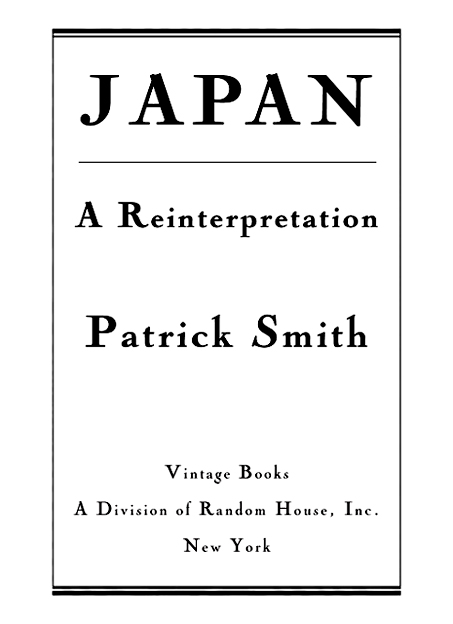Acclaim for Patrick Smiths
JAPAN
Enter Patrick Smith, whose new book adds an invigorating blast of fresh air to some very stale arguments. He brings both a reporters sharp eye and an experts analytical grasp to a subject desperately in need of attention. What makes Japans task so urgent, and Smiths book so timely, is that he is right. An excellent primer on postcold war Japan.
Time
A stimulating, provocative book. From the spirited prologue to the very useful bibliography in the back, the author has set out to show us the real Japan. He has a good reporters eye. He obviously developed a wide acquaintanceship among Japans political leaders, business people and cosmopolitan intelligentsia. Unlike most Japanologists, who concentrate with boring intensity on economics, Smith gives the reader a really interesting look at Japans writers and educators. Knowledgeable and thought provoking.
The New York Times Book Review
[An] excellent book illuminating. Smiths penetrating examination of its culture and society [has] brilliant observations
Washington Post
A smart, clear-sighted view that seeks to understand the Japanese as they are, not as we think they are.
Portland Oregonian
His book, replete with personal anecdotes, takes up such topics as the lives of sararimen (salary men), the relationship between the sexes and the construction state that has uglified Japan and enriched its politicians while poisoning its politics.
Houston Chronicle
Refreshingly cant-free about what ails Japan and where it might be heading. [Draws] on literary and sociological resources as well as on personal observations.
Business Week
Smith makes a valuable connection between his themethe stifling of the individual in Japanand the nations political malaise. [He] sets out to challenge the popular perception of Japan as a nation of worker bees willing to sacrifice the personal for the greater good.
Far Eastern Economic Review
Japan-watchers around GBN hold this book in very high regard as a significant reality check on the theories-du-jour about Japan.
Global Business Network Book Club
Smiths new non-fiction book [is] an important effort toward building that new framework of understanding. Smith intends to update antiquated views, drawing a general portrait of Japanese society, culture and government, putting defining events of the last 50 years into historical perspective.
San Francisco Examiner
Patrick Smith
JAPAN
Patrick Smith has worked as an editor and correspondent for more than twenty years (fourteen of them in Asia) with, among other publications, The New York Times, the Financial Times of London, the International Herald Tribune, and The New Yorker. He is the author of The Nippon Challenge: Japans Pursuit of the Americas Cup. He lives in Norfolk, Connecticut.
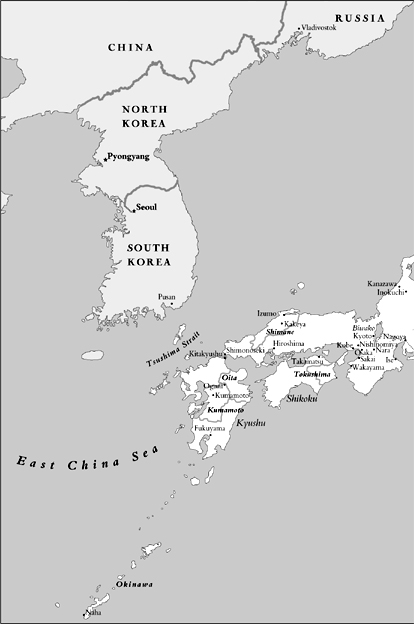


FIRST VINTAGE BOOKS EDITION, OCTOBER 1998
Copyright 1997 by Patrick Smith
All rights reserved under International and Pan-American Copyright Conventions. Published in the United States by Vintage Books, a division of Random House, Inc., New York. Originally published in hardcover in the United States by Pantheon Books, a division of Random House, Inc., New York, in 1997.
Certain passages of this book have appeared in very different form in the Economist Yearbook, the International Herald Tribune, National Geographic, and The New Yorker.
Grateful acknowledgment is made to the following for permission to reprint previously published material:
Alfred A. Knopf, Inc.: Excerpts from In Praise of Shadows by Junichiro Tanizaki (Alfred A. Knopf, Inc., 1933). Reprinted by permission of Alfred A. Knopf, Inc. The New York Times: Excerpt from an article by Kinnosuke Adachi (New York Times Sunday Magazine, 1/9/27). Copyright 1927 by the New York Times Co. Reprinted by permission of The New York Times. University of California Press: Poem The Day the Mountains Move by Akiko Yosano from Recreating Japanese Women, 1600-1945, edited by Gail Lee Bernstein. Copyright 1991 by the Regents of the University of California. Reprinted by permission of the University of California Press.
The Library of Congress has cataloged the Pantheon edition as follows:
Smith, Patrick (Patrick L.)
1. Japan: A reinterpretation/Patrick Smith
p. cm.
JapanCivilization. 2. JapanCivilization1945 3. JapanCivilization American influences. 4. JapanHistoryAllied occupation, 19451952. I. Title. DS821.S6424 1997 96-39220
952dc21
eISBN: 978-0-307-78972-3
Map design by Vikki Leib Studio
www.randomhouse.com
v3.1
Cara Caro,
for you.
And to the memory of Sean Gervasi,
honorable friend.
But the underlying strangeness of this world,
the psychological strangeness,is much more
startling than the visible and superficial.
L AFCADIO H EARN ,
Japan: An Attempt
at Interpretation, 1904
NOTE TO THE
VINTAGE EDITION
I have made a few changes in this Vintage Books edition of Japan: A Reinterpretation. Minor errors of fact have been corrected; a few passages have been amended or augmented to suggest complementary themes. But this Vintage edition in no way represents a revision of the original work.
P.S.
A NOTE ON NAMES
Because this book is written primarily for Western readers, I have rendered Japanese names according to Western practice. The given name is first, the family name follows. The Japanese are of many minds when naming themselves in international company, and my judgment is intended merely to avoid confusion. In a few cases, such as Soseki Natsume, people are known by their given (or chosen) names. He is Soseki in subsequent mentions, not Natsume. These instances are noted in the text.
P.S.
CONTENTS
Prologue
The lid has been warped
And no longer fits on the chest.
B ONCHO ,
The Summer Moon,
1690
IN THE EARLY 1990s ten small machinery companies in Tokushima Prefecture, a rural district of Shikoku Island, unveiled an unusual product. They proposed using robots to perform plays from the old Japanese tradition of puppet theater. A prototype was produced, stock characters planned. Each would consist of more than five hundred parts. Tiny robots draped in traditional clothing would be programmed to make every required move for the full length of the old dramas.
Something in the Tokushima puppets intrigued me. A robotic geisha dressed in kimono or an electronic samurai with sword and topknot surely said something about the way Japan evolves, about the connection between its past and its future. They eventually reminded me of the opening passage in one of the centurys great books on Asia, Joseph Levensons




